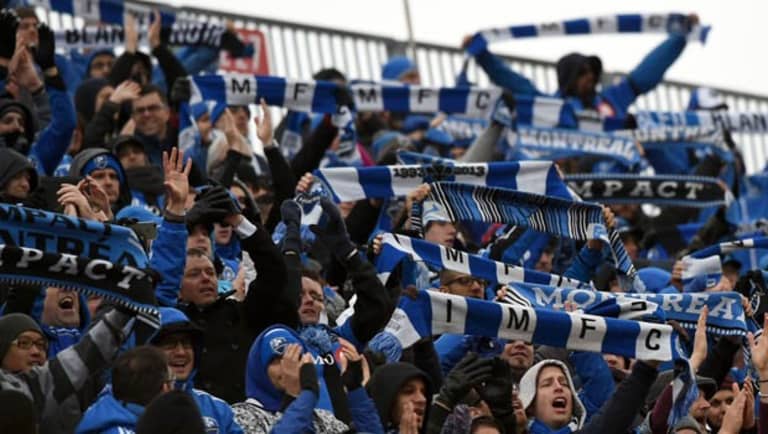I’ve attended a handful of World Cup games, World Cup qualifiers in the United States and Central America, four MLS Cup finals, and more MLS regular-season and playoff games than I can reliably remember.
Through it all, three matches, three occasions and three environments stand out: Panama hosting the United States in a wild Hexagonal finale at Estadio Rommel Fernandez in Oct. 2013; a festive World Cup Round of 16 clash between the US and Belgium in Salvador, Brazil in the summer of 2014; and the second leg of the CONCACAF Champions League final that saw Club America travel north to take on the Montreal Impact at Olympic Stadium last year.
All three made the hair on my arms stand on end for minutes at the time, but there was something extra special about the the electricity that coursed through Olympic Stadium on that chilly April day, something about the way a team and their city rallied together in spite of long odds.
On Sunday evening, after the Impact and Toronto FC heaped a double helping of playoff misery on the red and blue sides of New York to lock in an all-Canada Eastern Conference Championship, I thought back to that match, one that went from delirium to disappointment for the home side but which lives on in the collective memories of the more-than 61,000 people who packed the Big O that day.
On Nov. 22, 2016, when the Impact’s archrivals and their red-clad fans roll up the King’s Highway for Leg 1, I suspect Montreal will have another one of those days. Same for the return match eight days later in Toronto at the gorgeous, remodeled BMO Field. Each occasion will be a deserved touchstone moment written into the soccer history books in Quebec, Ontario and Canada.
This showdown, dubbed the "401 Derby" after the highway that runs most of the way between the cities, builds on the city's longstanding hockey rivalry – but it runs far deeper than mere sport. It reflects "the Two Solitudes," a nation's centuries-old fault line of culture, language and identity dating all the way back to the Seven Years' War (aka the French and Indian War to Yanks).
And now this matchup won’t just be regional. Canadian soccer, thanks to inspired playoff runs from the Impact and TFC, is about to force its way into a conversation it’s never been in before.
Frankly, it’s about time.
It’s about time the 401 Derby got the spotlight it deserves. It’s about time a Canadian team plays in a Conference Championship, a place in MLS Cup on the line. It’s about time those of us south of the border acknowledge what our Canadian counterparts already know: Major League Soccer is far more than Seattle-Portland, more than the LA Galaxy, more than Red Bulls-DC, more than the NY Derby, more than a predominantly American league complimented by a couple party crashers from up north.
In Toronto, they’re busy building a North American superclub, an organization with the fanbase, facilities, squad and unapologetic ambition required to seed an MLS dynasty. In Montreal, Joey Saputo has cultivated a cosmopolitan club that attracts top-tier international players and prioritizes the development of local talent, including head coach Mauro Biello.

Between them, TFC and the Impact boast the two most thrilling players in MLS, with sincere apologies to Nicolas Lodeiro, in Sebastian Giovinco and Ignacio Piatti. Next week, Michael Bradley and Jozy Altidore will pull on the US national team jersey as Reds. For a few more weeks at least, Didier Drogba will be known to the world as an Impact player. No matter what happens, Patrice Bernier and Jonathan Osorio will rep their respective cities, on the field and off.
All of them are chasing one thing, a prize only four teams and four cities still have in their sights.
Over the course of eight days in late November, MLS history will be written. One Canadian city’s soccer heart will swell with pride, the other’s will drown in sorrow. A rivalry between cities and teams as historic and contentious as any in MLS will take center stage. Two stadiums will reverberate with the passion those head-to-head meetings inevitably inspire.
For the first time in the history of the league, a Canadian team will play for MLS Cup – and perhaps even win it. It’s about damn time.











